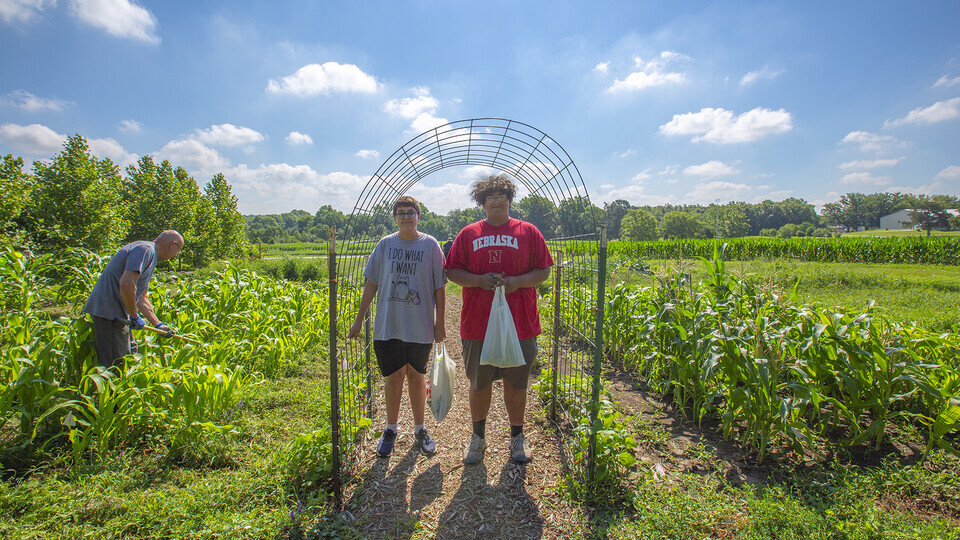
Lincoln, Neb. —A University of Nebraska–Lincoln program is helping Native American teens gain hands-on lessons regarding traditional Indigenous peoples’ farming beliefs and practices.
Established in fall 2021, the university’s Native American Coalition Food Sovereignty Program offers teens from Lincoln Public Schools the opportunity to meet weekly with tribal elders, members of Nebraska Extension and the College of Agricultural Sciences and Natural Resources, and other members of the university community to learn about how to garden and feed their families. It also reinforces respect for the land from a Native perspective.
“As advocates, we felt that this was a good program and a good way for our students to stay connected with the culture, especially those more urban Natives who haven’t been to the reservation schools or haven’t grown up in the reservations,” said Robert Perales, one of three LPS Native American student advocates. “It’s a really good way for them to see the traditions and keep those alive. It’s something the kids really enjoy.”
The program, run by Tribal Extension Educator Ted Hibbeler (Sicangu Lakota), occurs each Saturday year-round. The students meet with Hibbeler and other educators on East Campus to talk about their Indigenous cultures and learn about the farming process from planting to harvesting. For example, some of the university’s Master Gardeners worked with the students in the greenhouse and taught them seed germination. Other university faculty members in agronomy, horticulture and more have partnered with the program to educate students.
Each lesson begins with breakfast and a traditional Native prayer, followed by discussions about traditional practices and a lecture on farming-related science from university members.
Matteo Perales, a recent LPS graduate and program participant who will attend Nebraska U in the fall, said the program helped connect him with his culture. It also helped him become familiar with East Campus before he starts in the fisheries and wildlife program.
“In the winter, we started an Indigenous worldview book called ‘Braiding Sweet Grass’, which showed us different Native farming teachings,” he said. “Then professors came out and showed us things like bugs, we created beehives, we learned different ways to get rid of weeds, how to test pH levels in dirt and other things they specialize in.
“I really enjoy the garden space and the different Native teachings; it’s taught me a lot that I didn’t know.”
During the classes, Hibbeler would take the teachings from “Braiding Sweet Grass” and merge them with the Indigenous lessons he was taught growing up. Hibbeler said that while western science views the earth and plants objectively and separately, Indigenous culture takes a more subjective view in that people are an integral part of the coexistence of the earth and plants. The Indigenous teaching of reciprocity is that as long as people help take care of the earth, the earth is going to take care of the people.
Hibbeler, who is from Rosebud, South Dakota, has been involved with Native youth education for 45 years. He’s passionate about sharing his knowledge with these students who want to learn the practices and language but may not have had the opportunity until now.
“What’s missing from western science classes is the Indigenous worldviews,” Hibbeler said. “Our relationship with the earth and the plants is missing. So that spiritual connection was being taught to these young people every Saturday morning for the first hour-and-a-half.”
During the summer, the students apply their knowledge in the Indigenous Garden on East Campus. The garden, northeast of the College of Law, is new this summer.
The students plant, weed and harvest the crops to support food security with Indigenous families in Lincoln. Any leftover food is donated to the Food Bank of Lincoln.
Crops include zucchini, strawberries, watermelon and the three sisters, which is a traditional Native pairing of corn, beans and squash. The crops were chosen by the Native students, who talked about their own Indigenous cultures and the plants their parents and grandparents would traditionally grow.
The program is funded by a well-connected communities grant through the 4-H Foundation, which helped pay for the morning breakfast and equipment.
Organizers are continually looking for ways to improve the program. Hibbeler is working with campus partners to build incentives into the program for the students to bridge over to the university and expand Native enrollment.
Other supporters such as Louise O’Brien Lynch, Tim Dungan, Ann Powers and Christian Elowsky have helped make this program possible.
“Without them, we wouldn’t have been able to pull this off,” Hibbeler said. “It’s been a really great partnership between CASNR faculty, Nebraska Extension and the Native American students from the Lincoln Public School District.”







